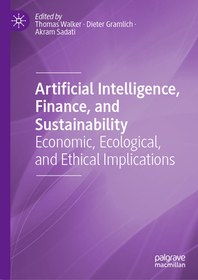
Artificial Intelligence, Finance, and Sustainability
Economic, Ecological, and Ethical Implications
- Publisher's listprice EUR 192.59
-
79 876 Ft (76 073 Ft + 5% VAT)
The price is estimated because at the time of ordering we do not know what conversion rates will apply to HUF / product currency when the book arrives. In case HUF is weaker, the price increases slightly, in case HUF is stronger, the price goes lower slightly.
- Discount 12% (cc. 9 585 Ft off)
- Discounted price 70 291 Ft (66 944 Ft + 5% VAT)
Subcribe now and take benefit of a favourable price.
Subscribe
79 876 Ft

Availability
printed on demand
Why don't you give exact delivery time?
Delivery time is estimated on our previous experiences. We give estimations only, because we order from outside Hungary, and the delivery time mainly depends on how quickly the publisher supplies the book. Faster or slower deliveries both happen, but we do our best to supply as quickly as possible.
Product details:
- Edition number 2024
- Publisher Springer Nature Switzerland
- Date of Publication 28 September 2024
- Number of Volumes 1 pieces, Book
- ISBN 9783031662041
- Binding Hardback
- No. of pages309 pages
- Size 210x148 mm
- Language English
- Illustrations XX, 309 p. 23 illus., 17 illus. in color. Illustrations, black & white 709
Categories
Long description:
As the world increasingly recognizes the importance of sustainability, businesses and investors are looking for ways to integrate sustainable practices into their operations and investment decisions. At the same time, advancements in artificial intelligence (AI) and technology are transforming the finance industry and are enabling more data-driven decision-making. The intersection of these fields presents a significant opportunity to accelerate progress towards a more sustainable future, while also improving financial performance.
This book explores the crucial role of AI in sustainability and finance, examining how financial technologies and machine learning are shaping the approach of finance professionals towards environmental, social, and governance (ESG) issues. It provides a comprehensive and integrated perspective on how these areas are becoming increasingly intertwined and examines the ethical and social implications of AI in finance and its potential to unlock new opportunities for sustainability. By focusing on the practical implications of these intersections and including both case studies and expert analysis, the book provides valuable insights for practitioners, policymakers, academics, and students alike.
MoreTable of Contents:
INTRODUCTION.- Chapter 1: Artificial Intelligence, Finance, and Sustainability: An Overview.- PART 1: CONCEPTUAL (INTEGRATIVE) FRAMEWORKS.- Chapter 2: A Panoramic Overview of the Opportunities and Challenges Artificial Intelligence Brings to ESG Investing.- Chapter 3: Measuring Sustainability with Artificial Intelligence.- Chapter 4: Enhancing Sustainable Finance Advisory and Literacy through AI-based Personalization.- Chapter 5: Artificial Intelligence to Advance Sustainability: A Review of Progress.- Chapter 6: The Future of Sustainable Finance: AI-Driven Sustainable Pairs Trading in Market-Neutral Investing.- PART II: CLIMATE AND ENERGY.- Chapter 7: Predicting Carbon Emissions with Explainable Machine Learning Models: Applications for Chinese Provinces.- Chapter 8: Assessing Physical Climate Risks: An AI-Powered Tool for Businesses.- Chapter 9: The Role of Artificial Intelligence in Energy Efficiency and Finance.- PART III: REPORTING AND REGULATION.- Chapter 10: Enhancing the Issuance and Monitoring of Sustainable Finance Instruments through Artificial Intelligence.- Chapter 11: The Law of Fintech: How Artificial Intelligence and Innovative Technologies Contribute to a Sustainable Financial Industry and Its Effective Regulation.- Chapter 12: Corporate Digital Responsibility for Artificial Intelligence: Towards a Disclosure Framework.- Chapter 13: The Implications of Adopting Artificial Intelligence in the Auditing Process.
More



